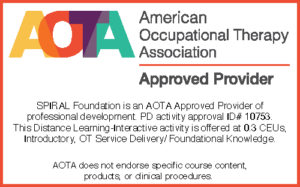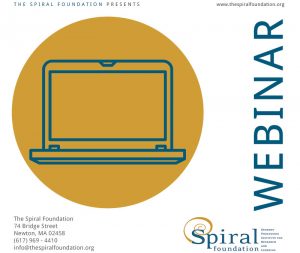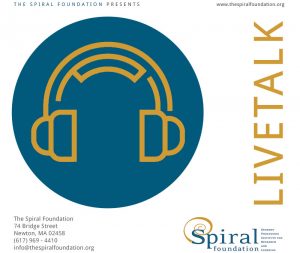Description
Amy Coopersmith, OTD, OTR/L, MA Ed and Peggy Morris OTD, OTR/L, BCP
Members receive a 20% discount applied at checkout
All parts of the course, including all assignments, must be completed in a 60-day viewing period
Description: This course provides a comprehensive review of self-determination theory and practice, with specific application for sensory regulatory capacities for school-based practice. Student empowerment will be emphasized, utilizing a strengths-based lens for evaluation, goal-writing, and intervention choices. Drawing from self-determination theory, the Individuals with Disabilities Education Act (IDEA), and peer-reviewed evidence, participants will gain insights into designing effective interventions that promote student success within the Least Restrictive Environment (LRE). The lecture utilizes a PowerPoint presentation, and video. Slides, references, live link, and recordings are available within your account.
Course Schedule: Detailed schedule may be accessed here
- Foundations of School Practice and Best Practice Service Delivery Model
- Self-Determination Theory and School Outcomes
- Why Use a Strengths-Based Approach in Evaluation and Interventions?
- Review of Sensory Processing Disorder (SPD)
- School-Based Evaluation Process
- Strengths-based Goal Writing
- Interventions Designed for the Context of Everyday Routines at School
- Incorporating a Self-Determined Approach
- Case Studies
Learning Objectives: By the end of this short-course, the participant will be able to:
- Identify the necessary differences between school-based sensory-based interventions and clinic-based interventions for sensory regulation, given the contextual factors of both service sites.
- Apply self-determination theory and approaches to promote student ownership of individualized preferred sensory regulation strategies.
- Select strategies to support students’ participation and engagement in daily school routines through self-determined management of their sensory systems.
Audience: OTPs, Educators, Parents
Course Level: Introductory
AOTA Areas: Occupational Therapy Service Delivery, Foundational Knowledge.
Contact Hours: This course is approved for 3.0 contact hours, 0.3 AOTA CEUs.
Completion Requirements: To earn contact hours or AOTA CEUs for this course participants must view this course in it’s entirety, and successfully submit and complete sample intervention sessions and the course quiz.
About the Speakers:
Amy Coopersmith, OTD, OTR/L; MA Ed, is a self-determination advocate with over 30 years of experience as a pediatric occupational therapist and teacher. As a school-based therapist for 17 years in New York City, she worked as a clinician, evaluator and supervisor serving over 100 schools. Amy noticed that the child-led teaching methods she had used during her ten years as an educator made a big difference in children’s lives. She implemented those ideas as an occupational therapist and found that children made faster progress and demonstrated greater motivation and engagement using these methods. In 2022, Amy earned her doctorate from Temple University, where she conducted a research study on children’s self-determination. She continues to present at national conferences, lead workshops across the globe, mentor practitioners, and develop new materials to translate research into effective practice.
Margaret (Peggy) Morris OTD OTR/L BCP, is a pediatric occupational therapist with 30+ years of experience in early intervention, private practice, and schools practice, and 12 years of experience teaching evidence-based/evidence-informed pediatric practice at Tufts University Department of Occupational Therapy. Peggy has presented at state and national OT conferences on various pediatric and school-based topics. She developed an online Certificate of Advanced Professional Practice (CAPS) in School-based Practice through Tufts Occupational Therapy Department and has completed a mentorship with Dr. Lucy Miller at The STAR Institute. Peggy is a certified MIEA (Mindfulness Institute for Emerging Adults; formerly Koru) mindfulness instructor. Peggy’s current research involves mindfulness training for stress reduction among occupational therapy graduate students.
Disclosure: Speakers will be compensated for this presentation.
ADA/Section 504: If you require special accommodations, please contact courses@thespiralfoundation.org
Cancellation Policies: Available here
Continuing Education:

Occupational Therapy Practitioners/ Occupational Therapy Assistants: SPIRAL Foundation is an Approved Provider of Continuing Education for occupational therapists and occupational therapy assistants by the American Occupational Therapy Association. The assignment of AOTA CEUs does not imply endorsement of specific course content, products, or clinical procedures by AOTA.



